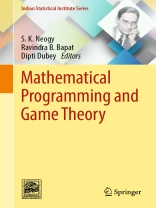This book discusses recent developments in mathematical programming and game theory, and the application of several mathematical models to problems in finance, games, economics and graph theory. All contributing authors are eminent researchers in their respective fields, from across the world. This book contains a collection of selected papers presented at the 2017 Symposium on Mathematical Programming and Game Theory at New Delhi during 9–11 January 2017. Researchers, professionals and graduate students will find the book an essential resource for current work in mathematical programming, game theory and their applications in finance, economics and graph theory. The symposium provides a forum for new developments and applications of mathematical programming and game theory as well as an excellent opportunity to disseminate the latest major achievements and to explore new directions and perspectives.
Daftar Isi
Chapter 1. A Unified Framework for a Class of Mathematical Programming Problems (Dipti Dubey).- Chapter 2. Maximizing spectral radius and number of spanning trees in bipartite graphs (Ravindra B. Bapat).- Chapter 3. Optimization problems on acyclic orientations of graphs, shellability of simplicial complexes, and acyclic partitions (Masahiro Hachimori).- Chapter 4. On ideal minimally non-packing clutters (Kenji Kashiwabara).- Chapter 5. Symmetric Travelling Salesman Problem (Tiru Arthanari).- Chapter 6. About the links between equilibrium problems and variational inequalities (D. Aussel).- Chapter 7. The shrinking projection method and resolvents on Hadamard spaces (Yasunori Kimura).- Chapter 8. Some Hard Stable Marriage Problems: A Survey on Multivariate Analysis (Sushmita Gupta).- Chapter 9. Approximate Quasi-Linearity for Large Incomes (Mamoru Kaneko).- Chapter 10. Cooperative Games in Networks under Uncertainty on the Costs (L. Mallozzi).- Chapter 11. Pricing competition between cell phone carriers in a growing market of customers (Andrey Garnaev).- Chapter 12. Stochastic games with endogenous transitions (Reinoud Joosten).
Tentang Penulis
S.K. NEOGY is Professor at the Indian Statistical Institute, New Delhi. A Ph.D. from the same institute, his primary area of research is mathematical programming and game theory. He is co-editor of books:
Modeling, Computation and Optimization, Mathematical Programming and Game Theory for Decision Making (both from World Scientific). He is has also been a co-editor of the special issue of several journals:
Annals of Operations Research, entitled Optimization Models with Economic and Game Theoretic Applications (2016),
International Game Theory Review, entitled Operations Research and Game Theory (2001), and
Applied Optimization and Game-Theoretic Models, Parts I and II (2015). He has published widely in several international journals of repute like
Mathematical Programming, Linear Algebra and its Applications, OR
Spektrum, SIAM Journal on Matrix Analysis and Applications, SIAM Journal on Optimization, International Journal of Game Theory, Dynamic Games and Applications, Annals of Operations Research, and
Mathematical Analysis and Applications. He is a reviewer of zb MATH and Mathematical Reviews.
RAVINDRA B. BAPAT, Ph.D. from the University of Illinois at Chicago, is Professor at the Stat-Math Unit, Indian Statistical Institute, New Delhi. He had his schooling and undergraduate education in Mumbai. He obtained his B.Sc. degree from the University of Mumbai, and M.Stat. from the Indian Statistical Institute, New Delhi. After spending one year in Northern Illinois University in De Kalb, Illinois, and two years at the Department of Statistics, University of Mumbai, Professor Bapat joined the Indian Statistical Institute, New Delhi, in 1983. He held visiting positions at various universities in the U.S.A. and visited several institutes abroad in countries including France, Holland, Canada, China and Taiwan for collaborative research and seminars. The main areas of research interest of Professor Bapat are nonnegative matrices, matrix inequalities, matrices in graph theory and generalized inverses. He has published more than 100 research papers in these areas in reputed national and international journals and guided several Ph.D. students. He has written books on Linear Algebra (co-published by Hindustan Book Agency, Springer and Cambridge University Press). He wrote a book on mathematics for the general reader, in Marathi, which won the state government award for 2004 for the Best Literature in Science.
Professor Bapat has been on the editorial boards of
Linear and Multilinear Algebra, Electronic Journal of Linear Algebra, Indian Journal of Pure and Applied Mathematics and
Kerala Mathematical Association Bulletin. He has been elected Fellow of the Indian Academy of Sciences, Bangalore, and the Indian National Science Academy, New Delhi. Professor Bapat served as the president of the Indian Mathematical Society during its centennial year 2007–2008. For the past several years, he has been actively involved with the Mathematics Olympiad Program in India and served as the national coordinator for the program. Professor Bapat served as the head, Indian Statistical Institute, Delhi Centre, during 2007–2011. He was awarded the J.C. Bose Fellowship in 2009.
DIPTI DUBEY is a post-doctoral fellow at the Indian Statistical Institute, New Delhi. A Ph.D. from the Indian Institute of Technology Delhi, her primary area of research is mathematical programming and game theory. She has published widely in several international journals of repute like
Linear Algebra and Its Applications, Linear and Multilinear Algebra, Annals of Operations Research, Dynamic Games and Applications, Operations Research Letters and Fuzzy Sets and Systems. She is a reviewer of many international journals on optimization and Math reviews.












